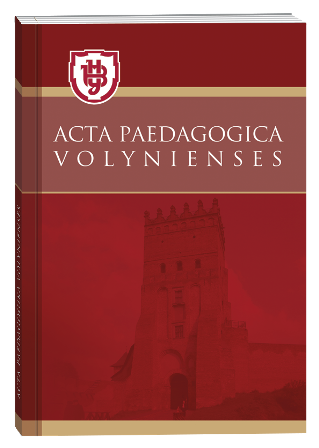НАВЧАЛЬНІ ІГРИ У ВИКЛАДАННІ АНГЛІЙСЬКОЇ МОВИ У ВИЩІЙ ОСВІТІ: ТЕОРЕТИЧНЕ ОБҐРУНТУВАННЯ НА ОСНОВІ ЛІНГВОДИДАКТИЧНИХ КОНЦЕПЦІЙ
DOI:
https://doi.org/10.32782/apv/2025.3.14Ключові слова:
навчальні ігри, англійська мова, іноземна мова, лінгводидактикаАнотація
У статті обґрунтовується ефективність навчальних ігор у викладанні англійської мови на основі основоположних лінгводидактичних концепцій, що стали фундаментом сучасного викладання. Особливу увагу приділено навчальним іграм як засобу підвищення мотивації та комунікативної активності студентів. Аналізуються основні теоретичні підходи, що обґрунтовують ефективність ігор у мовному навчанні: Гіпотеза взаємодії (M. Long), Теорія конструктивістського навчання (J. Piaget, L. Vygotsky), Теорія засвоєння другої мови (S. Krashen) та Теорія самовизначення (E. Deci, R. Ryan). Підкреслюється, що ігрова форма сприяє створенню низькотривожного, підтримуючого середовища, активному залученню студентів і забезпечує зрозуміле мовне введення відповідно до рівня i+1. Ігри також підтримують внутрішню мотивацію, сприяючи задоволенню базових психологічних потреб: автономії, компетентності та приналежності. Конструктивістські теорії підкреслюють роль активної участі, досвіду та соціальної взаємодії у формуванні знань, що знаходить втілення у співпраці та дослідницькому характері ігор. Наприклад, теорії S. Krashen підкреслюють значення афективного фільтра та зрозумілого мовного впливу, які реалізуються через рольові та контекстуальні ігри. Теорія самовизначення (E. Deci, R. Ryan), Теорія потоку (M. Csikszentmihalyi), Теорія залучення (G. Kearsley, B. Shneiderman) пояснюють, як ігри сприяють внутрішній мотивації, залученості та позитивному емоційному досвіду завдяки автономії, зворотному зв’язку, співпраці й викликам. Біхевіористська теорія (B. F. Skinner) пояснює, як через систему винагород і повторення ігри сприяють формуванню мовних навичок. Теорія інтерактивної гіпотези (M. Long) підкреслює важливість взаємодії та узгодження значення, які часто трапляються в мовленнєвих ігрових ситуаціях. Отже, навчальні ігри поєднують у собі ключові компоненти провідних лінгводидактичних теорій і слугують потужним інструментом розвитку мовних компетентностей. Таким чином, навчальні ігри виступають ефективним засобом формування іншомовної комунікативної компетентності, забезпечуючи не лише пізнавальний, а й емоційно-мотиваційний ефект у процесі навчання.
Посилання
Chang, B. B. (2009). Cognitive Load Theory: An Empirical Study of Anxiety and Task Performance in Language Learning. Taipei : Takming University of Science and Technology, Taiwan.
Charles, F. B. and Coombs, P.H. (2010). The World Educational Crisis: A System Analysis. New York University Press.
Slavin, R. E. (2010). A Synthesis of Research on Language of Reading Instruction for English Language Learners. Review of Educational Research, 75(2), 247 – 254.
Long, M. H. (1996). The role of the linguistic environment in second language acquisition. In W. C. Ritchie & T. K. Bhatia (Eds.), Handbook of Second Language Acquisition (pp. 413–468). Academic Press.
Naylor, S. & Keogh, B. (1999). Constructivism in classroom: Theory into practice. Journal of Science Teacher Education, 10, 93–106.
Krashen, S. D, (1982). Principles and practice in second language acquisition. Oxford, Pergamon Press. Krashen, S. (1985). The input hypothesis : Issues and implications. New York : Longman.
Deci, E. L., & Ryan, R. M. (1985). Intrinsic motivation and self-determination in human behavior. New York, NY : Plenum.
Egbert, Joy. (2003). A Study of Flow Theory in the Foreign Language Classroom. Canadian Modern Language Review-revue Canadienne Des Langues Vivantes – CAN MOD LANG REV. 87. 499–518.
Kearsley, G., & Shneiderman, B. (1998). Engagement theory: A framework for technology-based teaching and learning. Educational technology, 38(5), 20–23.
Khare, K. (2018). The state of flow while learning. A Teacher’s Hat. Medium. Retrieved from https://bit.ly/3t0jGcf
Rixon, Steven. (1981). How to Use Games in Language Teaching. London: Macmillan.
Canale, M., M. Swain. (1980). Theoretical bases of communicative approaches to second language teaching and testing. Applied Linguistics, 1. 1–47.
Cranmore, J. L. (2022). BF Skinner: lasting influences in education and behaviorism. In The Palgrave Handbook of Educational Thinkers (pp. 1–16). Cham : Springer International Publishing.
Gage, N., & Berliner, D. (Eds.). (1991). Educational psychology (5th ed.). Boston : Houghton Mifflin.
Littlewood, W. (1981). Communicative language teaching. Cambridge : Cambridge University Press.
Staal, M. A. (2004). Stress, cognition, and human performance: A literature review and conceptual framework (NASA Technical Memorandum No. TM–2004–212824). Ames Research Center : National Aeronautics and Space Administration.
##submission.downloads##
Опубліковано
Як цитувати
Номер
Розділ
Ліцензія

Ця робота ліцензується відповідно до Creative Commons Attribution 4.0 International License.







